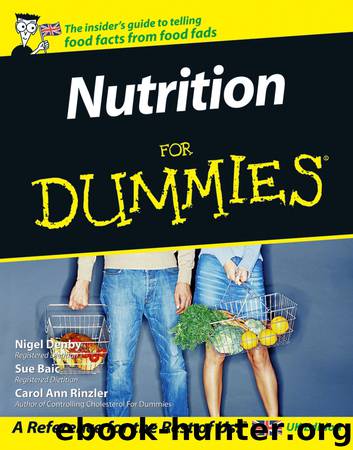Nutrition For Dummies by Nigel Denby

Author:Nigel Denby
Language: eng
Format: epub
Publisher: John Wiley & Sons, Ltd.
Munching More Minerals: People Who Need Extra
If your diet provides enough minerals to meet the RNIs, you’re in pretty good shape, most of the time.
But a restrictive diet, the circumstances of your reproductive life, and just getting older can increase your need for minerals. Here are some scenarios.
You’re a strict vegetarian
Vegetarians who avoid fish, meat, poultry, and eggs must get their iron from fortified and wholegrain cereals, seeds, nuts, dried fruit, green leafy vegetables, pulses, and beans. Because iron in plant foods is bound into compounds that are difficult for the human body to absorb, taking a source of vitamin C such as salad, fruit juice, or fruit with your meal can help you absorb the iron.
Vegans – vegetarians who avoid all foods from animals, including dairy products – have a similar problem getting the calcium they need. Calcium is in vegetables, but it, like iron, is bound into hard-to-absorb compounds. So vegans need calcium-rich substitutes. Good food choices are soya milk fortified with calcium, orange juice with added calcium, tofu processed with calcium sulphate, nuts, and seeds.
A similar story applies to zinc. Good vegetarian sources include wholegrain cereals, green vegetables, pulses, and beans, as well as some nuts and seeds. However the zinc in plants, like the iron and calcium in plants, is less efficient than the zinc in foods from animals.
Mineral supplements may be useful for some vegetarians with a limited range of foods.
You’re a woman
The average woman of reproductive age loses about 20 milligrams iron a month during menstruation. Women whose periods are very heavy lose more blood and more iron and need more than the RNI. Because getting the iron you need from a diet providing fewer than 2,000 calories a day may be difficult, you may develop a mild iron deficiency. To remedy this, some doctors prescribe a daily iron supplement.
Women who use an intrauterine device (IUD) may also take iron supplements because IUDs irritate the lining of the uterus and cause a small but significant loss of blood and iron.
Ferreting out the ferrous stuff in iron supplements
The iron in iron supplements comes in several different forms, each one composed of elemental iron (the kind of iron your body actually uses) coupled with an organic acid that makes the iron easy to absorb.
The iron compounds commonly found in iron supplements are
Ferrous citrate (iron plus citric acid)
Ferrous fumarate (iron plus fumaric acid)
Ferrous gluconate (iron plus a sugar derivative)
Ferrous lactate (iron plus lactic acid, an acid formed in the fermentation of milk)
Ferrous succinate (iron plus succinic acid)
Ferrous sulphate (iron plus a sulphuric acid derivative)
In your stomach, these compounds dissolve at different rates, yielding different amounts of elemental iron. So supplement labels list the compound and the amount of elemental iron it provides, like this:
Ferrous gluconate 300 milligrams
Elemental iron 34 milligrams
This tells you that the supplement has 300 milligrams of the iron compound ferrous gluconate, which gives you 34 milligrams of usable elemental iron. If the label just says ‘iron’, that’s shorthand for elemental iron.
Download
This site does not store any files on its server. We only index and link to content provided by other sites. Please contact the content providers to delete copyright contents if any and email us, we'll remove relevant links or contents immediately.
Craft Beer for the Homebrewer by Michael Agnew(18222)
Marijuana Grower's Handbook by Ed Rosenthal(3662)
Barkskins by Annie Proulx(3355)
Project Animal Farm: An Accidental Journey into the Secret World of Farming and the Truth About Our Food by Sonia Faruqi(3208)
The Plant Messiah by Carlos Magdalena(2916)
Red Famine: Stalin's War on Ukraine by Anne Applebaum(2913)
0041152001443424520 .pdf by Unknown(2839)
Organic Mushroom Farming and Mycoremediation by Tradd Cotter(2681)
In the Woods by Tana French(2579)
Beer is proof God loves us by Charles W. Bamforth(2441)
7-14 Days by Noah Waters(2406)
Borders by unknow(2300)
Between Two Fires by Christopher Buehlman(2290)
Reservoir 13 by Jon McGregor(2286)
Meathooked by Marta Zaraska(2254)
The Art of Making Gelato by Morgan Morano(2245)
Birds, Beasts and Relatives by Gerald Durrell(2209)
The 7 Habits of Highly Effective People: Powerful Lessons in Personal Change (25th Anniversary Edition) by Covey Stephen R(2183)
The Lean Farm Guide to Growing Vegetables: More In-Depth Lean Techniques for Efficient Organic Production by Ben Hartman(2123)
